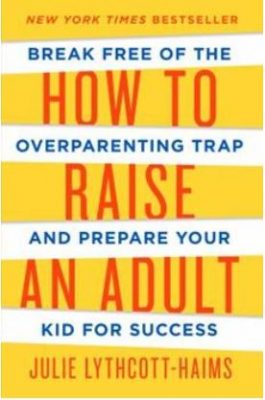By Carissa Rutkauskas
As the parent of three children, the eldest of whom is in his first year of high school, and someone who spends her weekdays promoting concurrent enrollment, I am always on the lookout for resources to help our family along our journey to produce happy, fully-functioning adults. Julie Lythcott-Haims’s How to Raise an Adult: Break free of the Overparenting Trap and Prepare Your Kids for Success was mentioned in an online Facebook group I follow and I knew by the title that I had to read it (full disclosure: I don’t have time to read, but audiobooks are great!)
I loved it. From the topic of each chapter, to the external references and resources she mentions, her personal experiences (as a college dean and mother), interviews, and research all held opportunities for thought to better parenting. In our household, we believe that independence, self-reliance, and self-efficacy is equally important as teamwork and communal experiences. Some of Lythcott-Haims’s suggestions may seem extreme for some families, but it provides ideas that promote healthy boundaries in the parent-child relationship. All parents want to protect their kids, but at the same time, one of the greatest gifts we can provide are the tools for them to become capable, curious, autonomous humans. I couldn’t help but to self-reflect as I made my way through the chapters. Was I a permissive, authoritarian, or authoritative parent, or overlapping in some areas? (p. 146) Am I causing them psychological harm by doing for my kids what they can already do for themselves? (p. 94) Is it really true that there are fewer missing children than there were in the 1980s and that child abductions are done by a friend or relative? (p 15).
 I would love to include the title of each of her chapters, as each speaks volumes on its own, but here are just a few, from Part 3: Another Way, for thought:
I would love to include the title of each of her chapters, as each speaks volumes on its own, but here are just a few, from Part 3: Another Way, for thought:
12. The Case for Another Way
13. Give Them Unstructured Time
14. Teach Life Skills
15. Teach Them How to Think
16. Prepare Them for Hard Work
And it would be a shame not to include some of the books and articles that she references, as their clever titles lead to contemplation…
• Gist: The Essence of Raising Life-Ready Kids
• Less-Structured Time in Children’s Daily Lives Predicts Self Directed Executive Functioning
• Helicopter Parents: An Examination of the Correlates of Over-parenting of College Students
• How Not to Talk to your Kids: The Inverse Power of Praise
• Daring Greatly: How the Courage to Be Vulnerable Transforms the Way We Live, Love, Parent, and Lead
• Homework’s Emotional Toll on Students and Families
• Excellent Sheep: The Miseducation of the American Elite and the Way to a Meaningful Life
• The Decline of Plan and the Rise of Psychopathology in Children and Adolescents
• Last Child in the Woods: Saving Our Children from Nature-Deficit Disorder
Parents want what is best for their children and sometimes the hardest thing is letting go, giving kids the opportunity to invent themselves and parents the opportunity to reinvent themselves.